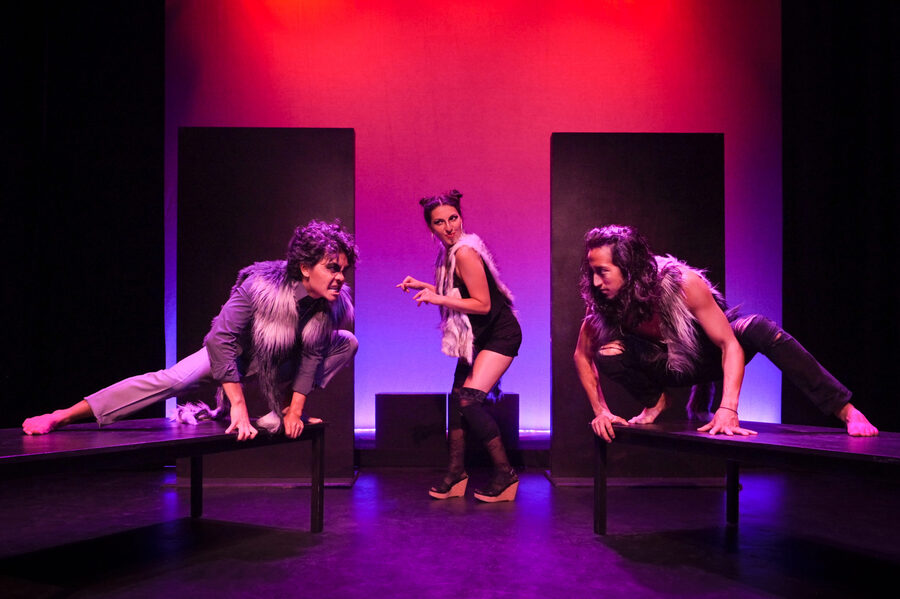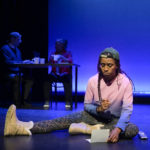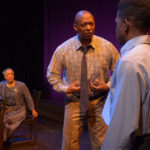It’s not film. (Except when it is.) It’s definitely not television. It’s…theatre on a screen? As COVID-19 continues to force industries online, one Bay Area organization is exploring a hybrid platform that could sustain theatre through the pandemic—and possibly beyond.
San Francisco’s PlayGround has launched a virtual Zoom Fest, experimenting with a new form of digital theatre. From May 11 to June 14, PlayGround is celebrating its 25th anniversary by livestreaming new works, developmental readings, short films, and full-length premiere presentations with more than 140 actors, as well as a greatest-hits highlight series.
The playwright incubator has transformed its annual Festival of New Works into a platform that epitomizes social distancing. Founded by Brighde Mullins, Denise Sharma, and current artistic director Jim Kleinmann, PlayGround serves as a starter program for playwrights, with a six-month-long Monday Night Writers Pool reading series designed to workshop short plays and help mold emerging talent.
Aaron Loeb, an alum of the Monday night series, started writing for PlayGround in 2002 before serving on its board of directors for several years. “From PlayGround, I learned the power of practice,” Loeb said, describing the process of developmental readings and the quick feedback that it provided. “PlayGround taught me the real power of that iteration loop.” His first PlayGround commission, 2007’s First Person Shooter, was read in the Zoom Fest as part of the highlight series.
PlayGround’s mission to support emerging playwrights not only helps them develop their work but also gives them a boost to keep creating. “Having a venue and a producer supporting your work is incredibly powerful,” said playwright Geetha Reddy. “That’s a role that PlayGround has always played.” Reddy’s play Safehouse was commissioned by PlayGround and premiered in 2010 as a co-production with SF Playhouse. It was also included among the 25th-anniversary highlights, as was her short film Obit.
More than 250 people are behind Zoom Fest, from playwrights and actors to designers and directors, with each person adapting their role to the new medium. Costume designers are using digital software to measure actors, sometimes only clothing the actor’s upper half. Scenic designers are turning their skills to virtual backgrounds, creating digital sets using green-screen technology. And sound and lighting technicians are helping actors create adequate recording spaces in their homes, ensuring they have the needed technical setup and Internet access.
“It’s a huge undertaking,” Kleinmann said. “It’s an exciting journey for us thinking about how we can get artists back at the center of the experience and giving them a chance to collaborate—and at the same time recognizing some of the barriers and challenges that we are all facing.”
Among those are psychological challenges that include the collective anxiety about COVID-19 but also hesitancy toward technology, he said. “There are people who haven’t yet gotten to a comfortable place with this, and we’re looking at how we can support them,” Kleinmann continued. “But we have seen an incredible transformation of artists who gain confidence and are becoming experts in this new form.”
The performers’ wariness, he said, stems from the risk of live performance over a virtual platform.
“We made a choice early that we were going to preserve the real-time experience and the risk that’s involved for performers, for artists, and for audiences,” Kleinmann said, rather than edit prerecorded videos to look like Zoom. As with live theatre, the actors must adapt and continue telling the story despite technical glitches or internet inconsistencies.
“It’s not film, it’s not television, it’s not theatre, but a weird hybrid of them all,” he said. “And it has its own unique rules that are still being defined.”
Director Kent Nicholson is still trying to figure out Zoom, as he directs the Zoom Fest readings of Trevor Allen’s Lolita Roadtrip and Ruben Grijalva’s Anna Considers Mars.
“It’s tricky,” Nicholson said. “It’s not a platform designed for live performance, so you have to make adaptations to what the performers do in order to make the story clear. As an example, you can’t do overlapping dialogue. The system won’t allow it.”
Nicholson is also participating in the festival’s Past, Present & Future panel discussion on June 8, during which he and other PlayGround alumni will revisit how the company helped shape their careers.
As actors take on Zoom, playwrights are also experiencing their work in a new form that has both benefits and shortfalls.
“It pales compared to theatre in most ways,” Loeb said. “But there are some ways in which it’s really exceptional. The actor’s ability to make moments meaningful because of the way they’re using the camera is very clever and kind of unique to the form.” One example of this came during the First Person Shooter reading in May, when the actors leaned toward the camera to whisper about another character, inviting the audience into the secret huddle.
Reddy said the Zoom format was a learning and growth experiment for her play, as the platform highlighted its strengths but also exposed its weaknesses.
The new works, including three full-length presentations, will not be considered world premieres, despite this being their debut. With COVID-19 suspending opportunities for stage productions, PlayGround elected to save the world premiere designation for future in-person performances.
“It was a decision made in concert with the writers, not trying to presume a category of production that we aren’t achieving,” Kleinmann said. “These plays are all adapted, essentially.”
Most of the content is available for free through a Zoom link emailed out 24 hours before the performance. Tickets for the full-length Zoom “premiere presentations” are available starting at $15. As the Zoom rooms filled beyond the capacity of PlayGround’s usual theatre space, Kleinmann began to question the company’s pre-COVID pricing model. He mentioned that livestreamed performances might open the theatre world to a different relationship with donors that could lead to easier access to performances for people in various economic situations.
Despite the affordable access to Zoom Fest, PlayGround is committed to paying artists. To that end PlayGround partnered with the Screen Actors Guild-American Federation of Television and Radio Artists (SAG-AFTRA). While the new-works festival usually involves contracts with both SAG-AFTRA (for the short film screenings) and Actors’ Equity Association (for stage performances), the Zoom Fest performances are operating solely under SAG-AFTRA contracts.
“Work by professionals in front of the camera is SAG-AFTRA’s jurisdiction and has been since SAG was started in 1933, and then recognized in 1937, and AFTRA, which followed in the area of television,” said SAG-AFTRA national executive director David White in a May 6 AFL-CIO Entertainment Sector press call. “During the pandemic, it’s been important to us, it’s been important to our leadership, to our membership—many of whom are dual members, or tri- members of multiple unions—that we are all doing what we can to ensure the viability of the industries that support all of the workforce represented here, and the unions and the members who work for them.”
From SAG-AFTRA’s perspective, White continued, figuring out jurisdiction during this pandemic is a time for generosity and a time for the unions to work with their sister unions to make sure they are doing what they can to support each other. As the pandemic continues and online programming standards change daily, PlayGround is working to produce content with the tools and organizations available at this time. On the same call, AEA president Kate Shindle said, “Our priority is to get our members to work to ensure that the organizations that employ us are able to survive, and we are prioritizing those things every single day.”
While Equity has created some COVID-19-specific contracts for online content, Kleinmann said the “SAG-AFTRA arrangement was a very good fit for us where we were able to have artists work in a safe, remote, socially distant manner and use the tools that were available to us.”
As the SAG-AFTRA contract helps negotiate safe working conditions for artists, PlayGround has found that Zoom is opening up more options for safe viewing conditions for audience members, namely in terms of accessibility.
“We’re watching audience members who haven’t been able to come to a live performance for five to 10 years show up as part of our digital audience,” Kleinmann said. In addition to mobility accessibility, Zoom provides content to those who would have required an assisted listening device in a performance space. But the platform hasn’t solved all accessibility issues yet, as it still lacks closed-captioning and audio description.
“There are ways that this art form can improve our accessibility when we talk about what the future of theatre is and how to make sure more people can make it and more people can experience it,” Kleinmann said.
“There’s a lot of great learning and experimentation happening,” he continued. “The PlayGround Zoom Fest is the beginning—whether we’re in this digital world for a week or a month or parts of the next year or two—to learn to start over, to take what I know and adapt it, and to try to be ready for a world that probably will never go back exactly the same.”
Kate Mazade is a Goldring Arts Journalism graduate student at Syracuse University.
A previous version of this article contained erroneous statements about the #FairWageOnstage movement, with which PlayGround has no affiliation, and incorrectly stated that Actors’ Equity Association is solely focused on live workspaces. In fact AEA has also created COVID-19-specific contracts for some online performances.







